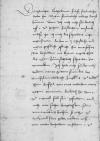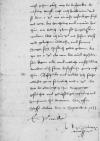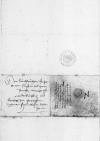Wann ich mich nicht sunderlich uff E(wer) Ir(barkei)t hochenn furstlichenn vorstandt vorlisz, / het ich mich dis schreibens nicht angenhomenn, / darzcw mich christliche / und meÿne geÿstliche pflicht thut vorursachen. / Bitt derhalbenn mit keÿner unguttigheit dis meÿnn zcuvorsichtlich schreiben zcwvormerckenn. / Ich habe nicht sunder mithleidenn / meines guttenn freundes, / des ernvhestenn Albrecht Fincke ⌊Olbrecht FingkAlbrecht Fincke ⌋, / E(wer) Ir(barkei)t underthann, zcwfhal / vonn eines entleibten mans wegenn / vornomenn, / dardurch her inn E(wer) Ir(barkei)t ungenad sold sein gefallenn / unnd nicht wirt sicher zcwgelossenn / seinn vorantwurttung zcwthun, / so ouch / E(wer) Ir(barkei)t Prussia, region in central Europe, bordered by Pomerania, Poland, Lithuania and Livonia. From 1466 Prussia was divided into Royal Prussia (Prussia Regalis), which was a part of the Kingdom of Poland, and Teutonic Prussia (Prussia Ordinis Theutonici) – covering the remnants of the former territory of the Teutonic Order’s state in Prussia. In 1525, the Order’s last Grand Master, Albrecht von Hohenzollern, converted to Lutheranism and became the first lay duke in former Teutonic Prussia (dux in Prussia), which from then on was called Ducal Prussia (Prussia Ducalis). At that time, as a result of the treaty of Cracow, Ducal Prussia became a fief of the kings of Poland⌊landePrussia, region in central Europe, bordered by Pomerania, Poland, Lithuania and Livonia. From 1466 Prussia was divided into Royal Prussia (Prussia Regalis), which was a part of the Kingdom of Poland, and Teutonic Prussia (Prussia Ordinis Theutonici) – covering the remnants of the former territory of the Teutonic Order’s state in Prussia. In 1525, the Order’s last Grand Master, Albrecht von Hohenzollern, converted to Lutheranism and became the first lay duke in former Teutonic Prussia (dux in Prussia), which from then on was called Ducal Prussia (Prussia Ducalis). At that time, as a result of the treaty of Cracow, Ducal Prussia became a fief of the kings of Poland⌋ / unnd seinn gutter / meidenn musz. / Wirt weitter derhalbenn vorhaltenn, E(wer) Ir(barkei)t  GStA, PK, HBA, C 2, No 48, f. 1v negst gehtann geboth, / was die dinstparkeit der rustung betrifft, / nicht noch zcwkomenn. / Und so dann E(wer) Ir(barkei)t wie ein recht vorstendiger furst wol weis, / das berichtung unnd antwurt zcwthun, / wie billich, / idrem sol zcwgelossenn werdenn, / bitt ich Eur Ir(barkei)t mit hohem vleisz, / wolt gedochtem Albrecht Fincke ⌊Albrecht(en)Albrecht Fincke ⌋ / unnd seinem swoger / freÿ christlich geleit gebenn, / das her vor E(wer) Ir(barkei)t, oder wem das wurd bepholen, / sein kegenn rede / unnd nottliche entschuldung, / donebenn auch seiner dinstpflicht genug mocht thun, / beschulde unnd vordine ich solchs alleczeit gerne fruntlich umb E(wer) Ir(barkei)t, / die Gott der allemechtig inn langweriger gesuntheit unnd gelugseliger regirung und zcwnhemenn thu bewarenn. /
GStA, PK, HBA, C 2, No 48, f. 1v negst gehtann geboth, / was die dinstparkeit der rustung betrifft, / nicht noch zcwkomenn. / Und so dann E(wer) Ir(barkei)t wie ein recht vorstendiger furst wol weis, / das berichtung unnd antwurt zcwthun, / wie billich, / idrem sol zcwgelossenn werdenn, / bitt ich Eur Ir(barkei)t mit hohem vleisz, / wolt gedochtem Albrecht Fincke ⌊Albrecht(en)Albrecht Fincke ⌋ / unnd seinem swoger / freÿ christlich geleit gebenn, / das her vor E(wer) Ir(barkei)t, oder wem das wurd bepholen, / sein kegenn rede / unnd nottliche entschuldung, / donebenn auch seiner dinstpflicht genug mocht thun, / beschulde unnd vordine ich solchs alleczeit gerne fruntlich umb E(wer) Ir(barkei)t, / die Gott der allemechtig inn langweriger gesuntheit unnd gelugseliger regirung und zcwnhemenn thu bewarenn. /
 GStA, PK, HBA, C 2, No 48, f. 2v
GStA, PK, HBA, C 2, No 48, f. 2v  GStA, PK, HBA, C 2, No 48, f. 1r
GStA, PK, HBA, C 2, No 48, f. 1r  GStA, PK, HBA, C 2, No 48, f. 1v negst gehtann geboth, / was die dinstparkeit der rustung betrifft, / nicht noch zcwkomenn. / Und so dann E(wer) Ir(barkei)t wie ein recht vorstendiger furst wol weis, / das berichtung unnd antwurt zcwthun, / wie billich, / idrem sol zcwgelossenn werdenn, / bitt ich Eur Ir(barkei)t mit hohem vleisz, / wolt gedochtem
GStA, PK, HBA, C 2, No 48, f. 1v negst gehtann geboth, / was die dinstparkeit der rustung betrifft, / nicht noch zcwkomenn. / Und so dann E(wer) Ir(barkei)t wie ein recht vorstendiger furst wol weis, / das berichtung unnd antwurt zcwthun, / wie billich, / idrem sol zcwgelossenn werdenn, / bitt ich Eur Ir(barkei)t mit hohem vleisz, / wolt gedochtem 

